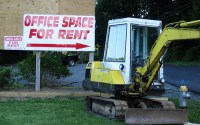April 16, 2014
Unlicensed Real Estate Agent Costs Brokerage $6.6 Million Commission
What tasks can real estate brokerages assign to employees lacking a real estate license? What risks does a brokerage run from allowing unlicensed agents to manage relationships with clients and other parties to the transaction? On April 4, 2014, Judge Anthony Trenga decided that a prominent commercial broker forfeited a $6.6 million dollar commission because a leading member of its team lacked a Virginia salesperson’s license. This blog post discusses how the brokerage lost the commission on account of the unlicensed manager.
The Hoffman Town Center is a 56 acre mixed-use development in Alexandria, Virginia. (Yours truly lived in Alexandria for 9 years. AMC Hoffman was my local movie theater. I ran across the finish line in the George Washington’s Birthday 10K race at the Town Center.)
The Landlord, Hoffman Family, LLC, sought office tenants for the development. In August 2007, Hoffman retained Jones Lang LaSalle Americas, Inc. (“JLL”) as its leasing agent. JLL itself has a valid Virginia broker’s license.
In October 2007, Arthur M. Turowski retired from the U.S. General Services Administration. JLL hired him as a Senior Vice President and assigned him to manage the Hoffman account. Torowski saw an opportunity to lease the property to the National Science Foundation. He marketed the property to the GSA, who successfully bid on behalf of the NSF. Turowski negotiated with GSA and city officials. He signed documents on behalf of JLL. In May 2013, Turowski achieved a $330 million lease for his client from the federal government. The NSF will be an anchor tenant in the development. See Jonathan O’Connell, Wash. Post, Judge Rules for Developer in $6.6 million National Science Foundation Suit.
Mr. Turowski helped Hoffman outshine other suitors and land a sought-after tenant. Unfortunately JLL made one oversight: Turowski lacked a real estate agent’s license while performing the work. Hoffman discovered this fact while defending a lawsuit brought by JLL for payment of the $6.6 million dollar commission (JLL rejected Hoffman’s offer of $1 million).
In its ruling, the U.S. District Court for the Eastern District of Virginia discussed the broad scope of activities for which Virginia law requires a license:
1. Activities Requiring a Licence. The legal definition of “real estate salesperson” is “clearly intended to capture the realities and breadth of activities that make up the leasing process.” This strengthens the real estate sales profession by recognizing business realities and restricting the scope of activities unlicensed persons may engage in. Va. Code Sect. 54.1-2101 “Negotiation” is a broad professional activity not limited to agreeing to a property and a price and signing documents.
2. Activities Not Requiring a License. The Virginia Code provides for a narrow set of activities an employee of a broker may do without a license, such as (a) showing apartments if the employee also works on the premises (b) providing prospective tenants with information about properties, (c) accepting applications to lease and (d) accepting security deposits and rents. Va. Code Sect. 54.1-2103(C). These do not include relationship management and negotiation on behalf of a client. JLL’s lawyers argued that Turowski did not engage in activities requiring a license. If that was the case, what licensee-level work earned the commission? The opinion notes that GSA opted to deal with some matters with Hoffman directly because JLL represented other landlords competing for the NSF tenant.
Judge Trenga found that Virginia law required Turowski to hold a license to work under JLL’s agreement with the Hoffman Family. Since he did not, the Court denied JLL’s request for any portion of the commission. The Court observed that a realtor agreement between an unlicensed agent and a client is void. JLL did have a broker’s license and Hoffman’s contract was with JLL. However, Virginia law does not allow brokers to use unlicensed employees as sales persons. The Court decided that JLL’s use of Turowski voided its commission. Even if a listing agreement is valid at the time it was signed, if the brokerage performs under it through an unlicensed salesperson, that performance violates public policy and voids the commission.
The opinion does not discuss whether any other JLL personnel worked on the Hoffman account. I wonder whether JLL would have received a monetary award if licensed sales persons performed some of the work? Perhaps the outcome would have been less harsh if Turowski was not the leader?
Could a licensed real estate sales persons have achieved a greater result for Hoffman? The opinion does not discuss specific damages that arose out of JLL’s failure to use licensed sales persons in performance of the agreement. The underlying agreement was not per se void. In the end, Hoffman got a $330 million lease negotiated by an (unlicensed) agent with deep familiarity with the agency he negotiated with. Unless the verdict is disturbed on appeal, Hoffman does not have to pay anything except its attorney’s fees defending this suit.
Daniel Sernovitz of the Washington Business Journal observes that this litigation gave both the developer and the broker black eyes. Sernovitz points out that JLL’s lawsuit cast a cloud over the project. The possibility of reversal on appeal keeps a shadow of doubt on whether Hoffman will have an extra $6.6 million to help finance the next phase in the development. Lastly, the Hoffman-JLL relationship was mutually beneficial prior to this fee dispute. JLL’s relationships could procure additional tenants. Hoffman may have to rely upon other brokerages moving forward.
Do you think that use of an unlicensed real estate agent presents the same risk to residential brokers?
case cite: Jones Lang LaSalle Americas, Inc. v. Hoffman Family, LLC, No. 1:13-cv-01011-AJT, 2014 WestLaw 1365793 (E.D. Va. Apr. 4, 2014)(Trenga, J.).
April 3, 2014
Commercial Leasing: New Developments in Acceleration of Rents
How much unpaid rent can a landlord of a commercial property collect against a tenant who has fallen into default? Arlington attorney John G. Kelly explored this issue in his blog post, Acceleration of Rents: Part 1, How to Ensure It’s Enforceable? Acceleration of Rents provisions typically give the landlord the right, after default by the tenant, to demand the entire balance of the unpaid rent under the lease paid in one lump sum. Without such a term, a Virginia landlord is only entitled to possession of the premises or to collect each rent payment as they become due. The landlord has no duty to mitigate his damages by re-letting the premises unless such is required by the terms of the lease. Kelly’s post shows that although this is a significant issue, there haven’t been many Virginia case opinions guiding landlords, tenants and their advisors. Kelly discusses a 1996 Virginia Circuit Court opinion that acceleration of rents provisions are enforceable unless they constitute a “penalty.” This reflects a concern that a landlord may be unjustly enriched if it receives accelerated rents under the defaulted lease and rents from a new tenant for the same premises. In the country there is an expression, “Pigs get fat, hogs get slaughtered.” As we will see, this principle may carry weight even when there is no affirmative duty to mitigate damages.
In September 2013, a new federal court opinion illustrated how acceleration of rents provisions may be enforced against tenants. A Federal Judge sitting in Lynchburg, Virginia awarded accelerated rents as damages arising from default of a lease of a nursing home property. Landlord Elderberry owned a 90-bed nursing facility in Weber City in Southwest Virginia. Elderberry rented it to ContiniumCare of Weber City, LLC to operate the nursing home. Continium continued to pay rent until March 2012. Three months later, the Virginia Department of Health & Human Services terminated the nursing home’s Medicaid Provider Agreement. Elderberry terminated the lease by letter in August 2012. Continium then vacated the premises. The property required substantial repairs and renovations for further use as a Medicaid facility. In January 2013, Elderberry re-let the premises to Nova, a new nursing home tenant.
The parties litigated this case heavily through extensive motions practice, discovery and a multi-day trial. Today’s blog post focuses on the Court’s interpretation of the acceleration clause provisions in the nursing home lease. The tenant asserted that the acceleration of rent provision was not enforceable because it constituted an impermissible “penalty” above and beyond fair compensation for actual damages.
Elderberry did not have a legal obligation to mitigate its damages. The landlord nonetheless gave the tenant credit for rents already collected from the new tenant and scheduled to be paid in the future for the term of the prior tenant’s lease. In addition to other damages, the Federal District Court awarded Elderberry $278,228.58 in unpaid rent up until the replacement tenant began paying rent and $125,857.04 in shortfall between the two leases. The court observed that the landlord’s efforts to invest its own funds into repairing and remodeling the premises mitigated tenants’ damages and returned it to functional use to Medicaid patients faster.
To secure a new lease, the landlord provided to the new tenant $588,708.60 in working capital above and beyond renovations and replacement furnishings invested in the premises by Elderberry. The defaulting tenants complained that Elderberry would receive a windfall if awarded both this working capital and the rent shortfalls. The Court observed that the landlord is entitled to rent increases under the new lease based on the amount of working capital provided. However, the shortfall is adjusted accordingly to prevent any windfall. The Court found the working capital to be a necessary incentive to a new tenant to take over the space and begin making rent payments mitigating the damages.
Retail leasing attorney Ira Meislik observes in his blog that the modern trend is for courts to interpret leases less like land conveyances and increasingly like commercial contracts. See his 2012 post, How Much Can a Landlord Collect from an Evicted Tenant? Elderberry illustrates how even in “land conveyance” states like Virginia, reasonable efforts to mitigate damages can facilitate the collection of the balance of accelerated rents. Avoiding unnecessary windfalls is a principle that underlies both mitigation of damages and the prohibition against penalty provisions in leases. In this case, the landlord re-let the premises before trial but after filing suit against the tenants. Like in many cases, the facts continued to develop after the lawsuit began. By adjusting their trial strategy to give a re-letting credit, Elderberry avoided asking for damages that tenants could easily argue were a windfall and hence a penalty. It is not clear whether Elderberry will actually collect all or even some of this judgment, but they did avoid getting “slaughtered” at trial.
The Defendants appealed the Western District of Virginia’s award of damages, and as of this blog post the Elderberry case is now on appeal before the U.S. Court of Appeals for the Fourth Circuit.
photo credit: pcopros via photopin cc (photo of a Lodge in Scott County, Virginia [same county where Weber City is situated]. Does not depict premises discussed in blog post)
January 2, 2014
Can My Landlord Evict My Business Without Going to Court First? – Part II – Complications to Landlord Self-Help
In Virginia, landlords have a right to evict commercial tenants without going to Court first. This does not make it likely or wise. Even in jurisdictions where self-help is legal, it is unusual to see landlords piling up their tenants’ business property on the curb. There are several reasons why:
1. Lease Terms: Any self-help must comply with the terms of the lease agreement. The laws of Virginia and its neighbors vary regarding a landlord’s remedies upon the tenant’s default. Many commercial leases are forms adapted from use in other jurisdictions. These forms may be a challenge to interpret under Virginia law. Even terms drafted with an eye to the law of the jurisdiction may not contemplate the exercise of the self-help remedies desired by the landlord’s agents. The terms of some lease agreements eliminate the right of self-help eviction entirely. Many other leases do not clearly define the landlord’s rights to exercise self-help. When parties negotiate the lease agreement, tenants typically request that any detailed landlord self-help eviction terms be edited out. The landlord often finds himself reserving, in a general way, its common law remedies, including self-help, without defining how they may be exercised. When the issue comes up upon default, both parties experience uncertainty regarding how a court would view the landlord’s threatened action.
2. Possibility of Property Damage: The landlord may be averse to taking possession of the property in a way that may damage the tenant’s property or involve physical confrontation with the tenant’s personnel. The landlord may desire an award or settlement for the balance of the lease. Property damage counterclaims complicate collection efforts.
3. Forcible Entry Claims: In certain situations landlords and tenants may be punished criminally under forcible entry, detainer or trespass for aggressive action taken with respect to the premises and business property in dispute.
4. Bankruptcy Stay: If the tenant is in bankruptcy, then an automatic stay likely prohibits self-help. The dispute between the landlord and the debtor-tenant over rights to possess the space is addressed in federal bankruptcy court.
5. Sublease: The landlord-tenant relationship may be complicated by a subletting arrangement. A sub-landlord and the master-landlord may disagree regarding their respective rights to possess the sub-leasehold. Disagreements between the property manager and the sub-landlord may delay action.
6. Institutional Landlords: The organizational structure of the landlord may play a role. When the same individual is the owner and property manager of the building, that person will likely exercise broader discretion than in a more institutional context.
These issues do not necessarily preclude the use of self-help. A risk-adverse landlord may view going to court to gain possession as a desirable alternative.
What should a tenant do if the landlord is threatening to take possession prior to going to court? The simplest options are to (a) avoid falling into default or (b) plan a move-out in advance if a default appears imminent. In certain situations, the circumstances of the business or relationship with the landlord may be too complex or attenuated for that. The tenant may have business operations or valuable property to protect. In any case, careful consideration of the lease terms and cogent communication with the landlord are essential. Where property and income are at stake, potential risks associated with changing locks and removing property are too great for either side to view landlord self-help as the logical first step towards resolving a dispute. In these situations, a tenant is best served by interacting with the landlord through experienced brokers and lawyers.
photo credit: vasilennka via photopin cc
December 31, 2013
Can My Landlord Evict My Business Without Going to Court First? – Part I
Part I – Landlord Self Help in Virginia
Suppose a company leases commercial property to run its business. Due to economic conditions, the tenant struggles to pay rent. The landlord has declared the tenant in default, or is threatening to do so. One of the remedies asserted by the landlord is “self-help” such as changing the locks and removing the business’ property from the premises. Can the landlord do that? What strategies and considerations are available to the tenant in such a situation?
When a tenant of a commercial property falls into default under the lease, or such default is imminent, knowing what options the landlord has moving forward is essential. The tenant making present use of the leased premises needs to know the landlord’s potential legal remedies so it can craft its own plan for the immediate future and to provide a framework for negotiations. In Virginia, and other jurisdictions where landlord self-help is permitted, threats such as changing the locks or otherwise barring the tenant from re-entry, removal of the property from the premises and placing it elsewhere may be the most urgent concern to a struggling commercial tenant. Understanding the respective rights of the landlord and tenant are crucial to planning continuity of business operations and safeguarding company property.
In Virginia, a landlord in a residential lease has no right of self-help eviction. However, the right of self-help remains an option for non-residential leaseholds. The commercial landlord is limited to using reasonable force in taking possession of the property upon default. The landlord may not “Breach the Peace” in taking possession. In other words, confrontation threatening physical harm is not permitted. Self-help may be attractive to the landlord in order to make an urgent transition to a new tenant without having to go to Court, take the case to trial and have the sheriff come out to the property.
While the remedy of self-help is legal in Virginia in non-residential matters, there are several considerations that make landlords reluctant to pursue it. In Part II, I will discuss several reasons why landlords usually avoid trying self-help eviction.




